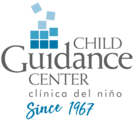SFSC Services
Helping Families and Children
Child Guidance Center provides a variety of evidence-based mental health treatment services, from our flagship Parent-Child Interaction Therapy (PCIT) program, to transformative therapeutic approaches for addressing the impact of trauma, or significant cognitive or behavioral health challenges, and their impact on children, youth and families.
More than 80 percent of the children and parents we assist (through 10 or more visits) achieve significant improvement in their mental health and overall well-being.
Our Specialty Programs
-
A 16-week, 32-hour group for veteran and military-connected fathers who want to strengthen their relationships with their children, promote positive behavior, and build a reliable network of peer support. This evidence-informed curriculum helps fathers develop effective parenting strategies in a safe, supportive environment.
-
An 8-week group program specifically designed for veterans to reduce and end intimate partner violence and aggression. The program teaches tools for healthy relationship-building, emotional regulation, and conflict resolution. Developed in partnership with the
Department of Veterans Affairs and supported by research in trauma and family systems.
-
Focused therapeutic support for families navigating the family court system. This program helps co-parents improve communication, reduce conflict, and prioritize the best interests of their children through guided, trauma-informed interventions.
-
Equine-Assisted Therapy is a therapeutic approach that incorporates interactions with horses to address emotional, psychological, and relational challenges. EAT is tailored for veterans and families facing issues like trauma, trust-building, emotional regulation, and reconnection. Through hands-on experience with horses, individuals, couples, and families can enhance traditional therapy, foster healing, and build resilience in a unique, non-judgmental environment.
Evidence-Based Practices
We integrate a variety of research-backed treatment modalities into our services to ensure high-quality, effective care:
-
A dyadic behavioral intervention that improves the quality of the parent-child relationship and helps manage challenging behaviors in young children (ages 2–7) through real-time coaching and play-based interactions.
-
A structured, short-term therapy that helps children, adolescents, and their caregivers overcome the impact of trauma. TF-CBT combines trauma-sensitive interventions with cognitive behavioral, family, and humanistic principles.
Department of Veterans Affairs and supported by research in trauma and family systems.
-
A highly effective treatment for PTSD and trauma-related conditions. EMDR helps clients reprocess distressing memories using bilateral stimulation to reduce emotional distress and foster adaptive thinking.
-
An evidence-based cognitive therapy designed to help individuals challenge and modify unhelpful beliefs related to trauma. CPT is particularly effective for treating PTSD in veterans and survivors of interpersonal violence.
-
A resilience-building program designed for military families that enhances communication, emotional regulation, and problem-solving to manage the challenges of deployment, transition, and trauma.
-
A present-focused, coping skills-based model that helps individuals recover from trauma and substance use. Seeking Safety is flexible and can be delivered in individual or group settings with a focus on rebuilding safety and stability.
Professional Training Opportunities
We offer training and education to professionals, clinicians, and community providers to improve services for veteran families:
-
Gain a deeper understanding of military values, language, service-related mental health challenges, and best practices for working with veterans and their families.
-
Training designed for legal professionals, social workers, and mental health providers supporting families involved in Family Court or Child Welfare proceedings. Focused on trauma-informed and family-centered interventions.
Department of Veterans Affairs and supported by research in trauma and family systems.


